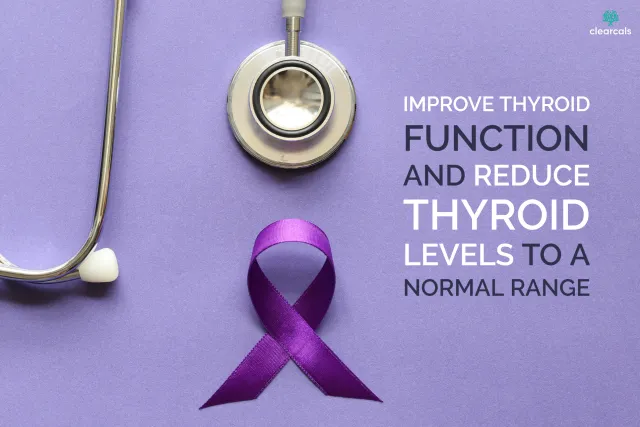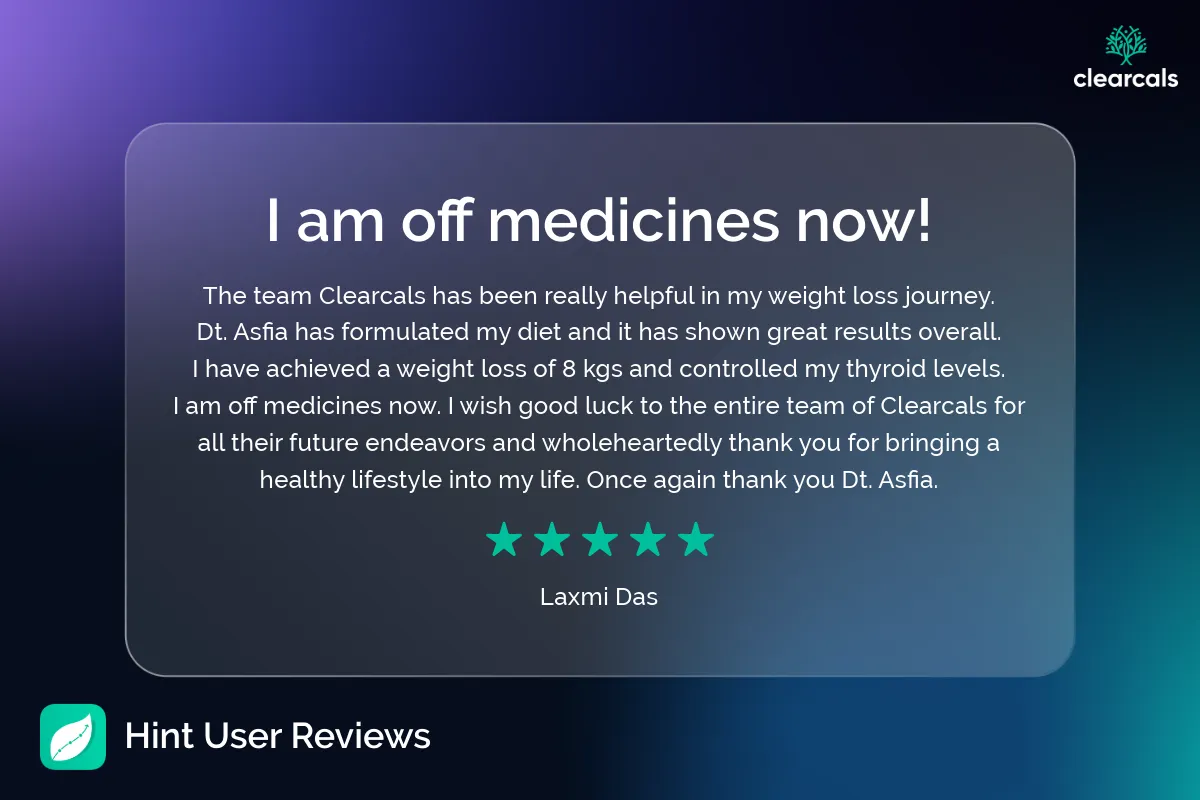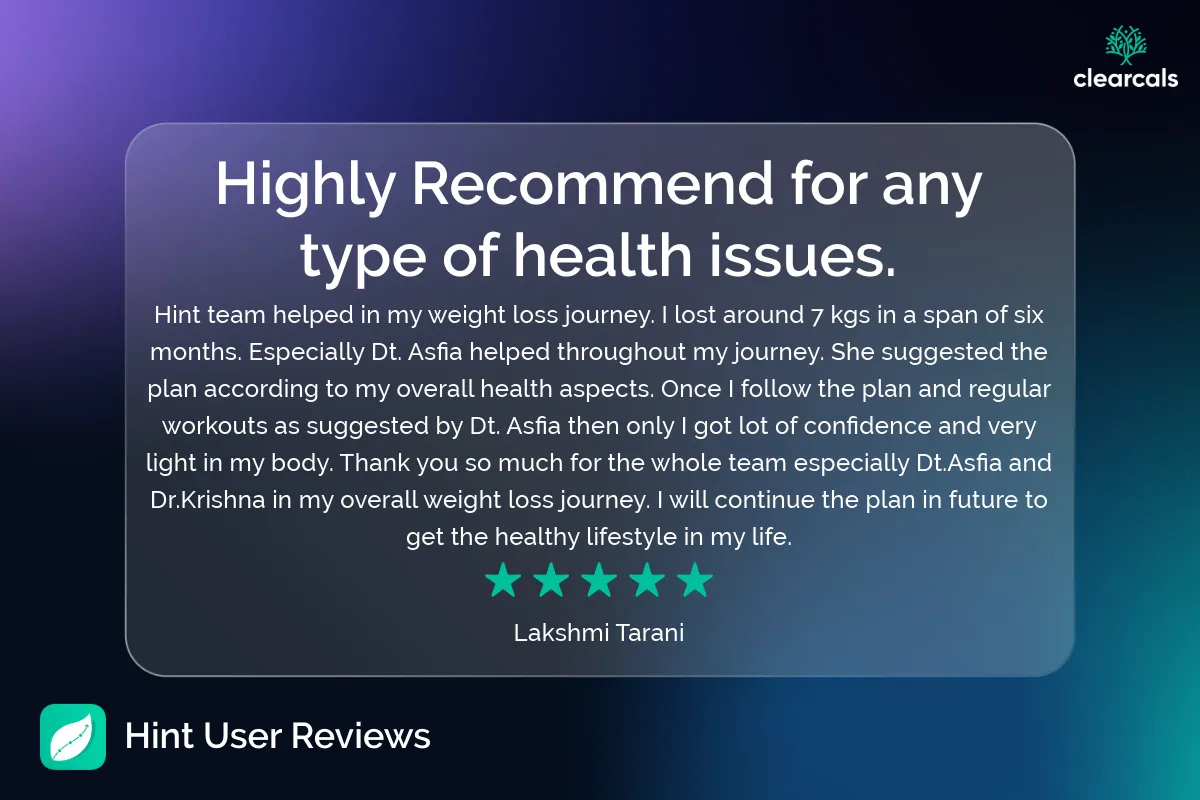Looking for a Personalized Diet Plan?
Indian Diet For Hypothyroidism - Instant Thyroid Diet Chart

TL;DR
- Managing hypothyroidism is now easier than ever with the Hint app.
- You can receive a personalized Indian diet plan for hypothyroidism within minutes, tailored to improve your TSH levels, boost metabolism and stamina, and reduce fatigue.
- This plan helps you achieve a healthy body weight while managing the symptoms of hypothyroidism.
- Below, you'll find essential do’s, don’ts, and general diet tips to help you effectively manage your condition.
- For any questions that aren't answered in our FAQs, feel free to reach out to us at support@clearcals.com!
How to Subscribe to Hint Pro or Hint Premium
Download and Install the Hint App:
Search for "Hint" on the Apple App Store or Google Play Store, download, and install it on your device.
Create an Account or Log In:
Open the app, create an account, and provide your profile details, including age, gender, height, weight, and physical activity level.
Choose a Subscription Plan:
Select "Subscribe to Hint Pro" and pick a plan (monthly, quarterly, or yearly). Review the features and benefits, including your personalized thyroid diet chart for managing hypothyroidism.
Alternatively, opt for Hint Premium, which includes unlimited consultations with expert dietitians along with your personalized thyroid diet chart.
Enter Payment Information and Confirm:
Complete the subscription process, and enjoy instant access to your personalized thyroid diet chart and other exclusive features.

Overview
Living with hypothyroidism comes with its own set of challenges, but there’s good news!
The Hint app provides a personalized Indian diet plan for hypothyroidism, tailored to help regulate thyroid hormone levels and improve TSH levels.
This plan focuses on nutrient-rich foods like those high in iodine, selenium, zinc, B vitamins, vitamin C, and vitamin E, all of which are essential for thyroid health.
The best part? You don’t need to buy expensive foods or supplements to follow this plan. It’s designed around everyday, affordable ingredients that fit into your lifestyle.
Additionally, the plan provides guidance on moderate physical activity, so there’s no need for intense workout regimens to maintain a healthy weight.
By subscribing to either Hint Pro or Hint Premium, you’ll receive instant access to a personalized thyroid diet chart and additional support to manage hypothyroidism effectively.
Key Benefits
- Improves TSH levels
- Supports healthy weight management
- Boosts metabolism and stamina
- Reduces fatigue and elevates mood
- Personalized thyroid diet chart for long-term thyroid health

Diet Types
The thyroid diet chart is available in three variations to suit different dietary preferences:
1. Indian Vegetarian Thyroid Diet Chart:
This diet includes plant-based foods and dairy products but excludes eggs, meat, fish, seafood, and other animal products.
2. Indian Ovo-Vegetarian Thyroid Diet Chart:
Includes vegetarian foods along with eggs but excludes meat, fish, and seafood.
3. Indian Non-Vegetarian Thyroid Diet Chart:
This version includes non-vegetarian foods such as meat, fish, and seafood, along with dairy products, eggs, and regular vegetarian foods.
Do’s and Don’ts for Hypothyroidism
Do’s:
- Take your thyroid medication immediately after waking up, and wait 15-30 minutes before consuming anything, such as coriander water, which helps manage hypothyroidism symptoms.
- Engage in regular physical activity for at least 30 minutes, and eat a balanced breakfast post-workout.
- Track your water intake and other key nutrients using the Hint app.
- Include selenium-rich snacks like Brazil nuts to support thyroid function.
- Use the Hint app to track your intake of selenium, zinc, B vitamins, vitamin C, and vitamin E, all of which are essential for thyroid health.
- Log your meals and track portion sizes using the Hint app to manage your calorie intake effectively.
Don’ts:
- Avoid skipping meals or starving yourself, as it won’t help with weight loss.
- Stay away from deep-fried and processed foods, as well as high-sodium and high-fat foods.
- Don’t drink tea or coffee on an empty stomach, and avoid consuming them after 6 pm.
- Avoid long periods of sitting, as it slows down your metabolism.
- Never skip your thyroid medication or take supplements like calcium and iron at the same time as thyroid medication, as they can interfere with absorption.
General Tips For Managing Hypothyroidism
- Regularly check your TSH levels every three months and log your meals daily using the Hint app to monitor calorie and nutrient intake.
- Chew your food well to aid digestion and prevent overeating.
- Avoid foods high in saturated fats, like processed meats, and opt for low-fat dairy products to reduce the risk of heart disease.
- Stay physically active, whether through walking, yoga, or strength training, to maintain healthy thyroid function.
- Practice stress-relieving hobbies and expose yourself to sunlight to boost vitamin D levels.
- Incorporate selenium-rich foods such as brown bread, paneer, and certain nuts into your diet for better thyroid health.

Frequently Asked Questions:
1. What should be normal TSH levels?
The normal range for TSH is 0.5 to 6 IU/mL. Read our blog on thyroid disorders for more details.
2. Which nutrients support thyroid function?
Iodine, selenium, and zinc are essential nutrients that support the thyroid gland’s function.
3. What foods are best for hypothyroidism?
Foods like iodized salt, brazil nuts, eggs, and selenium-rich foods such as dal, paneer, and brown bread are excellent choices.
4. Can you lose weight with hypothyroidism?
Yes, with the right diet and regular exercise, individuals with hypothyroidism can lose weight. The Hint app offers a personalized thyroid diet chart to help you achieve this.
5. What are the best exercises for hypothyroidism?
Activities like brisk walking, swimming, and yoga can help improve metabolism and thyroid function.
For more detailed answers to common questions, check out the FAQs section in the Hint app or our blog on thyroid health.
Final Thoughts
Managing hypothyroidism doesn't have to be overwhelming.
With the Hint app, you can easily access a personalized thyroid diet chart designed specifically for managing hypothyroidism.
By subscribing to Hint Pro or Hint Premium, you unlock features such as advanced nutrient tracking, meal logging, and unlimited consultations with expert dietitians. These tools will help you stay on top of your thyroid health, ensuring long-term success.
Download the Hint app today and start your journey toward a healthier, more balanced life with a personalized diet plan for hypothyroidism.






